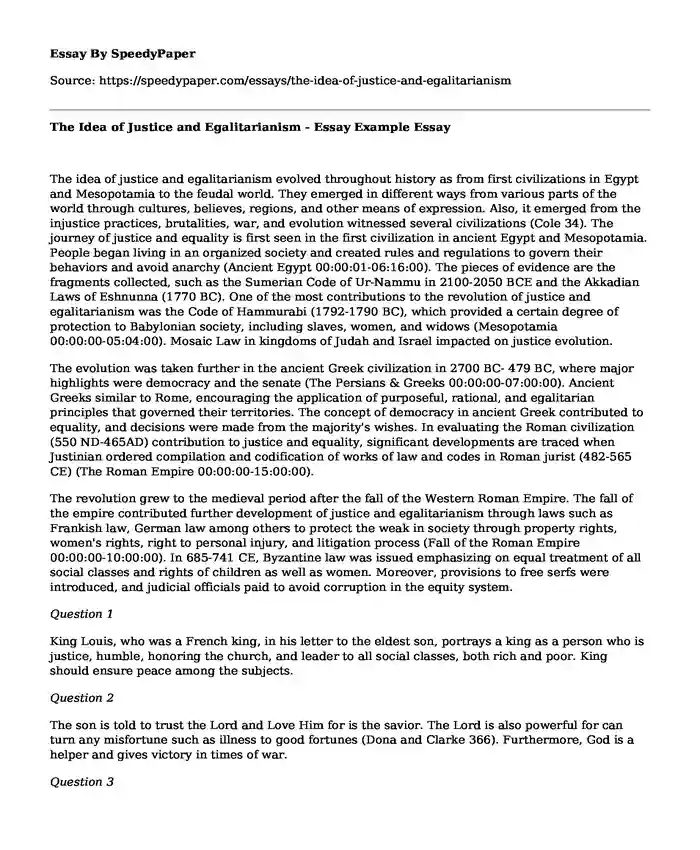
| Type of paper: | Essay |
| Categories: | Philosophy Ethics Community Essays by pagecount Ancient history |
| Pages: | 3 |
| Wordcount: | 711 words |
The idea of justice and egalitarianism evolved throughout history as from first civilizations in Egypt and Mesopotamia to the feudal world. They emerged in different ways from various parts of the world through cultures, believes, regions, and other means of expression. Also, it emerged from the injustice practices, brutalities, war, and evolution witnessed several civilizations (Cole 34). The journey of justice and equality is first seen in the first civilization in ancient Egypt and Mesopotamia. People began living in an organized society and created rules and regulations to govern their behaviors and avoid anarchy (Ancient Egypt 00:00:01-06:16:00). The pieces of evidence are the fragments collected, such as the Sumerian Code of Ur-Nammu in 2100-2050 BCE and the Akkadian Laws of Eshnunna (1770 BC). One of the most contributions to the revolution of justice and egalitarianism was the Code of Hammurabi (1792-1790 BC), which provided a certain degree of protection to Babylonian society, including slaves, women, and widows (Mesopotamia 00:00:00-05:04:00). Mosaic Law in kingdoms of Judah and Israel impacted on justice evolution.
The evolution was taken further in the ancient Greek civilization in 2700 BC- 479 BC, where major highlights were democracy and the senate (The Persians & Greeks 00:00:00-07:00:00). Ancient Greeks similar to Rome, encouraging the application of purposeful, rational, and egalitarian principles that governed their territories. The concept of democracy in ancient Greek contributed to equality, and decisions were made from the majority's wishes. In evaluating the Roman civilization (550 ND-465AD) contribution to justice and equality, significant developments are traced when Justinian ordered compilation and codification of works of law and codes in Roman jurist (482-565 CE) (The Roman Empire 00:00:00-15:00:00).
The revolution grew to the medieval period after the fall of the Western Roman Empire. The fall of the empire contributed further development of justice and egalitarianism through laws such as Frankish law, German law among others to protect the weak in society through property rights, women's rights, right to personal injury, and litigation process (Fall of the Roman Empire 00:00:00-10:00:00). In 685-741 CE, Byzantine law was issued emphasizing on equal treatment of all social classes and rights of children as well as women. Moreover, provisions to free serfs were introduced, and judicial officials paid to avoid corruption in the equity system.
Question 1
King Louis, who was a French king, in his letter to the eldest son, portrays a king as a person who is justice, humble, honoring the church, and leader to all social classes, both rich and poor. King should ensure peace among the subjects.
Question 2
The son is told to trust the Lord and Love Him for is the savior. The Lord is also powerful for can turn any misfortune such as illness to good fortunes (Dona and Clarke 366). Furthermore, God is a helper and gives victory in times of war.
Question 3
King Louis advises his son to have a merciful heart and give aid to the poor. And those in the misery of either soul or body to be comforted (Dona and Clarke 366). Adds that, if a poor person in the kingdom quarrels with the wealthy, the king should support the poor until the truth is known.
Question 4
King is usually associated with the rich and superior that the clergy. However, from the source, the king favors the poor and humble before the church and the subjects (Dona and Clarke 367). Most kings employ dictatorship contrary to the consensus system emphasized by Louis.
Question 5
In the modern world, the ideas of King Louis seem to be an old fashion of leadership. The leaders focus mostly on the demands of the people rather than the religious teachings. The modern world favors the rich, and the poor have little voices.
Work Cited
Cole, Joshua, and Symes, Carol. "Western Civilizations: Their History and their Culture. Brief Fourth Edition (Vol. 1)." 2016.
"Fall of the Roman Empire." YouTube, uploaded by CrashCourse, 4 Feb 2015, https://www.youtube.com/watch?v=3PszVWZNWVA
Dona, Munro, and George, Clarke. “Saint Louis’ Advice to His Son” 1910, pp. 366-75 https://sourcebooks.fordham.edu/source/stlouis1.asp
"The Roman Empire." YouTube, uploaded by CrashCourse, 4 Feb 2015, https://www.youtube.com/watch?v=oPf27gAup9U
"Ancient Egypt." YouTube, uploaded by CrashCourse, 4 Feb 2015, https://www.youtube.com/watch?v=Z3Wvw6BivVI
"Mesopotamia." YouTube, uploaded by CrashCourse, 4 Feb 2015, https://www.youtube.com/watch?v=sohXPx_XZ6Y&t=5s
"The Persians & Greeks." YouTube, uploaded by CrashCourse, 4 Feb 2015, https://www.youtube.com/watch?v=Q-mkVSasZIM&t=383s\
Cite this page
The Idea of Justice and Egalitarianism - Essay Example. (2023, Aug 27). Retrieved from https://speedypaper.com/essays/the-idea-of-justice-and-egalitarianism
Request Removal
If you are the original author of this essay and no longer wish to have it published on the SpeedyPaper website, please click below to request its removal:
- The Case of More Government and Higher Taxes, Free Essay Sample
- Essay Sample on the Impact of Mobile and Cloud Technology on Business
- Literary Essay Sample: Role of Context in Interpretation of Meaning
- Analysis of Gilgamesh, Literary Essay for Students
- Essay Sample Describing Social Work Practice with Hispanic Families
- Essay Example: Emotional Intelligence and Resonant Leadership in Schools
- Lavender Essential Oil for Burns. Paper Example
Popular categories




